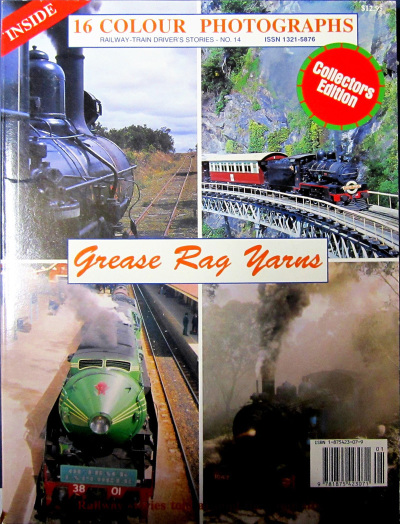
In the days of steam on the New South Wales Government Railways young men initiated their career as Trainee Enginemen to becoming a Train Driver, and their role as a Trainee Engineman included cleaning the steam engine cabins, managing the turntable, oiling the steam engine's rods and motions and the like.
After a period of time in this role, becoming familiar with the various steam engines, the trainee enginemen would attend an Acting Fireman's School run by the NSWGR with a Locomotive Inspector which ran for two weeks.
Having attended the Acting Fireman's School and passed their Acting Fireman's examination, they were then accompanied by a Locomotive Inspector on a road trip firing a steam engine hauling a freight train. In the Footplate Padre's case, he ran steam engines after his Acting Fireman's School under the direction of a Locomotive Inspector from Goulburn to Moss Vale and later, when able to run alone, shunters in the Goulburn Yard.
Nyngan
But at Nyngan Locomotive Depot out west of New South Wales in the days of steam rarely did an Acting Fireman - out of the Acting Fireman's School - get a trip out on the road with the Locomotive Inspector to learn the ropes – rather it was by themselves on the footplate. It was driver instruction by the driver.
This is a story from the Footplate Padre's book titled Steam Stories. This article was titled “Learning the hard way” on page 44. There were only some six drivers and eight fireman in the Nyngan Locomotive depot and so a number of full time Locomotive Fireman had to go off sick together, in order for the rostering staff to call out a trainee enginemen as an acting fireman to work a train on the road.
More so, when things got really busy with the wheat season - there was an occasional job on the road for these acting fireman who were working in the shed as the Shed Fireman. It was they who did the shed fireman's work - as the crews on the road didn't want a bar of the shed work.
At the depot was a man who had a permanent job on night shift as the Washout man. He and the Fuelman were known for their theft of grog and, invariably to hide their cache, they placed the bottles in the ashes (the cleaned out ashes dropped from the steam engines).
When this Washout man left the railway, instead of replacing him, this job fell to the Acting Firemen, they were busy helping the Shed Fireman (responsible for the steam engines being ready).
The rules changed a few years later and the Drivers and Fireman often had to do the Shed Fireman's work and prepare their own engines as was the norm in many other Depots around the State. Many depots had so many engines the Shed Firemen couldn't do them all.
The steam engines at Nyngan were invariably dirty, some even had dirty boilers. This proved a proclivity to 'prime' on heavy grades (a rush of sooty smoke as a result of a clogging in the boiler, a serious No No in platform areas).
The youngsters soon learnt from the old Drivers a technique of cleaning these boilers, ie cracking the “blowdown cock” with a dribble and thus smoothing the boiler's internals. Nyngan was a busy steam engine depot for all involved.
The Footplate Padre says this reminds him of the New Testament how the Apostle Paul took the young pastor Timothy under his wing and taught him the trade of being a Pastor of a local congregation. I and II Timothy are fascinating instruction books.

Dr Mark Tronson - a 4 min video
Chairman – Well-Being Australia
Baptist Minister 45 years
- 1984 - Australian cricket team chaplain 17 years (Ret)
- 2001 - Life After Cricket (18 years Ret)
- 2009 - Olympic Ministry Medal – presented by Carl Lewis
- 2019 - The Gutenberg - (ARPA Christian Media premier award)
Gutenberg video - 2min 14sec
Married to Delma for 45 years with 4 children and 6 grand children